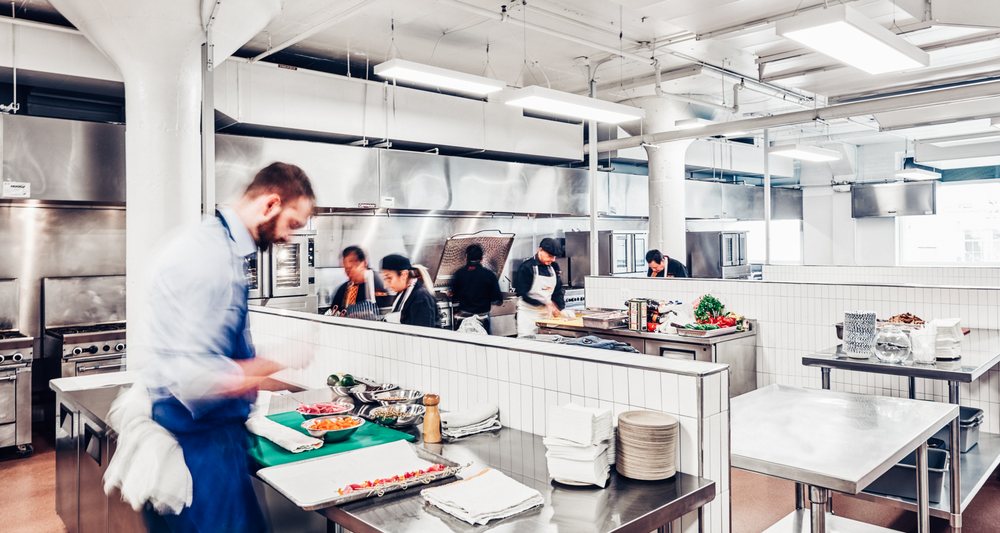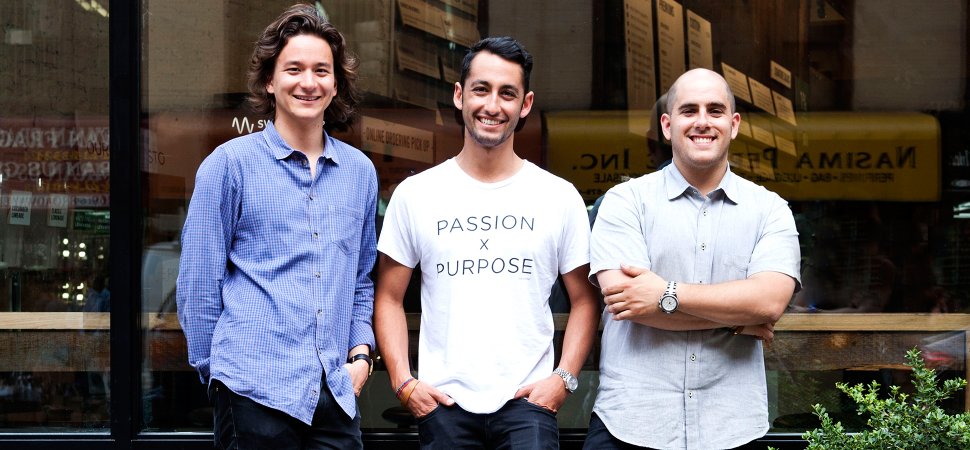![]()
Source: Pilotworks
As of mid-day, on Saturday, Pilotworks the shared kitchen provider that opened here in Chicago in May, and for which I worked last winter, announced its’ abrupt closure and shut down its’ four remaining facilities– Chicago, Dallas, Brooklyn, and Newark. The company’s closure leaves about three hundred young makers with no facility in which to manufacture, eliminates primary distribution avenues for those tied to the Pilotworks distribution network, and creates a mass layoff for the nearly 100 remaining employees with no notice and no severance.
The company has faced challenges for months. Just a month ago the company announced the closure of its Portland and Providence facilities. The company’s board unseated its original Co-Founder/CEO Nick Devane in the spring, which lead to an early series of layoffs and significant staff departures just post that (of which my own position, and that of 3 other members of my local Chicago staff were a part).
Over the next month, the main story needs to focus on the 300 start-up companies that were still operating in Pilotworks’ spaces on Saturday. Companies that Pilotworks was still billing and actively signing and recruiting as of the start of October – unironically, the signature of CEO Zach Ware still included the “Refer a Friend” recruitment link in his termination email distributed to staff Saturday morning.
As these makers head into the holiday season, which for some can represent as much as 40-45 percent of their annual revenue, they will need new manufacturing locations, new access to capital to bridge revenue and loss gaps, and solid support from consumers and buyers. Some, like those in Portland, Maine, were able to utilize their collective position to partner with a regional non-profit which they hope will provide new life to their facility. Despite the legal and ethical infractions Pilotworks’ actions open for its former members, many will be forced to suffer financial losses and failures.
In the longer term, though, there are some important take-aways from this series of events that hopefully we can learn from as we, collectively, work to move our industry forward.
1) Food is a viable industry, and we need people with expertise leading its much needed transformation.
Pilotworks was led to its’ close by a management team with very little actual food industry experience. CEO Zach Ware, a VTF Capital fund lead, liked to comment that he was well cut out for the job of leading a food company into a new space because of his personal “love” of tacos and “enthusiasm” for all things food.
The food industry – whether we are discussing hospitality, service, product, or manufacturing – is at its’ core an industry founded, run, and full of staff operating from a passion story or personal connection with food. It is the narrative that we all are drawn to and happy to cheer and support. These stories are impactful, they make for good marketing, and they are the basis of why we, as CONSUMERS, are drawn to products and services. But while that passion might lead someone into the food industry, the reality is that success is built upon those who can combine that passion with a willingness to work, a cultivation of expertise, and a development of business acumen to make their products and services successful.
As an industry we need to stop excusing poor ideas, poor execution, and poor leadership. We need to stop allowing our industry to be led and steered by people who think that money and outside skills or expertise they have will translate into the industry because “it’s just food.”
The food industry is complicated. The issues, problems, and faults of the industry need real change inspired by experienced leadership. We need innovation, ideas, and change driven by strong leaders with a genuine knowledge of how this industry can and should run, not just those with capital and skills they think can translate to food. The food industry needs to start taking responsibility for itself and making its own changes. We can’t just rely on tech bros and VCs to save us.
During my time at Pilotworks, I had to routinely explain the business back to the senior leadership that were setting our course – defining what equipment was and how it would be used, what culinary processes were and how those processes would impact spaces, and what the regulatory guidelines of the industry would require or allow.
A startup or company in the medical, legal, or industrial space would not allow itself to be steered and led by an individual with no expertise, length of service, or practiced knowledge of subject matter. But, in food, we do – whether because we doubt our expertise, we question the legitimacy of our industry and professions in comparison to others, or simply because we accept the myth that it’s about passion and willingness over all else.
2) Accountability to your employees, customers, and community is key in business.
In March 2016, Pilotworks CEO Zach Ware ironically noted in a blog post, “ What’s not ok, no matter how young your company, is delivering bad service.”
Pilotworks’ final decisions in regard to its members, employees, and investors in its’ last 6 months of operation clearly lacked accountability or an emphasis on serving these communities.
As people, we are taught that accountability stems from both being financially responsible and for having ethically guided responses to the commitments we undertake. There are certainly many times in each of our lives when these principles are tested, and some of us fail. But society functions because the majority of us, as people, don’t.
We also hold corporations, governments, and organizations to the same standard – it’s what validates their authority, or expertise, or gives us security in our interactions with them when we are turning over our time, money, or confidence. The fact that companies are able to routinely violate this trust – and so flagrantly demonstrate it – is where everything breaks down. And, unfortunately, in the start-up and food industries, it is downright common to display little or no regard for these rules.
Pilotworks marketed claims of a strong commitment to its’ members (the maker community) and its staff (the “team” that supported that community). The responsibility inherent in those claims is the foresight of ensuring that, even in failure, there is a demonstration of the partnerships and investments that those communities made in return in Pilotworks.
There is certainly no assumption that Pilotworks, its’ CEO Zach Ware, or its’ board (which includes notable restaraunteur and investor David Barber), took the decision to close the business lightly. But there is clearly a demonstration that in executing that closure they lacked any planning or commitment to protecting and promoting the very employees and businesses that were their lifeblood.4 There were obvious signs in the company over the course of the last six months that the company was in trouble – the change of executive leadership, the lack of completion of funding rounds, the scale back of project development, the closure of units, and the dismissal of employees en mass.
But where was the planning for this eventuality – no matter how hard the company was fighting to avoid it? The creation of a severance pool for employees, the proper notification of members for planning and re-location, the payment of vendor debts, the discontinuation of active solicitation of memberships and forward billing – any of these actions, even if undertaken in isolation, would have demonstrated some accountability to the populations the company claimed to serve.
We have to start expecting companies to be accountable – in the food industry and beyond – and being prepared to ask them to prepare for that in their execution and long-term planning.
The problems we face in the food industry go far beyond the small populations affected by Pilotworks’ current actions. But how can we expect to affect change and hold the corporations and entities accountable for larger issues – like pollution, immigration violations, fair wage battles, and many more – if we cannot start with some of the newest and with those that are designed and aimed at the most needing populations.
3) Diversity is not a marketing platform, it is about what you do.
Pilotworks’ first marketing campaign focused on “democratizing the food industry.” My first day on the job, I was introduced to an array of people from all backgrounds working in the kitchens in Brooklyn. The makers of Pilotworks were a diverse and inclusive group – with women and minorities making up a majority of the tenants at a majority of the facilities. It is these very groups that need the access and the foundational tools to build and develop their businesses – and making a commitment to this work and progress is important. However, despite the diversity of the populations that they were working with, Pilotworks’ own leadership was all white, and all male.
It is this imbalance which can no longer be taken for granted. If, as a company, you preach a policy of diversity and inclusive practice, then the leadership, workers, and backers of your business should align and be reflective of that policy. Without including diversity in the positions who make decisions and influence the policies and path of your venture, you are failing in the execution of actual inclusion.
The consumer is better educated today and wants to see that they are better represented in the companies that their dollars are going to support and grow. Similarly, the average employee is better informed and better educated, they deserve a seat at the table to provide meaningful insight into the companies that they are investing their time and talents into. Companies need to adjust their course to be reflective of the markets they want to engage and of the employees and constituencies they want to represent.
The problems facing the food industry – that companies like Pilotworks are designed to solve – will not be solved by boards and c-suites of white men. The change, innovation, systemic industry knowledge, and cumulative experience that we need to demand of our leadership and companies, as they attempt to tackle these problems, will need the input of people from a diversity of backgrounds and genders to make it an honest and reflective reality.
4) The numbers have to add up.
There is a general belief amongst a lot of startups, in the food industry and beyond, that creative math is a necessary part of the equation to success. And it is true in a sense – entrepreneurs have to be willing to take risks, spend money, and sometimes push past the normal bounds of +/- to deliver.
Yet in time, if your business lives in brick and mortar, delivers a defined product, or quantifies a service for a customer, then there has to be a budget and the math needs to move from “creative” to “clear.” In time, all of the real math can’t be hidden behind the spreadsheet cells without anyone able to explain it. And in time, if you are going to judge performance, livelihood, commission, and value for real people, employees, and customers, then those metrics have to be real numbers that intelligent people can explain – and explain all the way down.
Pilotworks had a real problem with creative math – with a majority of its units, save one, effectively operating without budgets or transparency of numbers and metrics. With no budgets, units and the central office that attempts to run them, have no foundation for performance, growth metrics, balance of spend, understanding of loss, or ability to account for change either positive or negative.
As a small business owner, we are all placed in a continuous loop of numbers – we need strong numbers to get capital, we need real numbers to grow and secure investment, and we need clear numbers to understand our failures or successes and judge our path forward. Whether large or small, a company with a lack of transparency in understanding, building, or upholding clear numbers and budgets amongst its’ teams is handicapping, if not committing itself to failure.
Transparency, especially financial transparency, is a larger topic that is a pervasive problem in the food and hospitality industry. There are so many buried layers and so much stigma attached to the numbers associated with wages, revenues, and pricing, that the industry acts under-the-table more than it should. Putting those numbers on the table, educating the members of our industry and communities about how to use and operate within these frameworks, and encouraging clear lines of communication amongst companies and employees will help us all to operate better. And hopefully, will help us to avoid failures like the one seen with Pilotworks – whose lack of budgets and numbers will now have a substantial impact on the bottom lines of many smaller companies and makers beyond.
5) No company is a one-person operation.
My husband used to tell me – when we ran our own businesses and would fall into a spot where we were down an employee or frustrated with an employee’s performance – that at the end of the day, the only two people that had to show up the next day were he and I. It was our company, our restaurant, and our dream – no one else was invested, or responsible, or required to be there, but us.
It was a good sentiment. It would usually catalyze in me a little more confidence in myself and my decisions and give me the strength or the needed push to get through to the next challenge.
And while it was helpful, it inherently just wasn’t true. Nor, quite honestly, should it be.
Employees are important. Collaborators, investors, partners – are all important to the life of our business in different ways. But employees, are some of our most important assets. Employees are typically the main point of contact for most of our customers, significant sources of feedback from those customers, and a good judge of the health and path of our companies.
When an employee signs on to work for a company, it becomes the responsibility of the CEO or owner to not only provide leadership, direction, and a clear path, but to advocate for that employee in return for the investment of time and talent that employee is making in the company.
The allegations against employers that have been rampant in the food industry in recent months exhibit a systemic failure of the companies and the leadership of those companies to advocate and protect their employees. Unfortunately, Pilotworks’ actions this past weekend continues that trend.
Pilotworks did not hire a full time HR representative until nearly a year and a half of operation – a point at which the company was already dealing internally with a raft of issues stemming from abuse of employees’ time, resources, and functionality. Further, the HR representative was brought on to work for the CEO, not as an advocate for the employees – which further explains why employees were not a factor in the eventual closure of the company.
The role of an autonomous HR representative in companies, especially in the food industry, is essential as we move the industry forward. Those companies who take the time to understand how to give employees the respect and resources they need to innovate, excel, and drive the company forward will benefit as the industry develops.
Pilotworks failure has had a tremendous immediate impact on a small community of makers, employees, and investors. However, in the long term, the impact will be even greater if we are not able to recognize and deal with the issues raised even in small case studies as this one. The conversation surrounding these issues is more involved than the actions of any one company.
The work to be done to change and move the food industry forward – which will impact the lives of millions of workers and consumers – is extensive. But taking the time to pause and learn, as clear examples of right and wrong present themselves, will leave us all better equipped to tackle the systemic issues beyond.
___________________
ABOUT ANDREA
![]()
Andrea J. Carbine is an industry advocate, entrepreneur, chef, and consultant working in food for over twenty years. For her work in the kitchen, she was recognized with two James Beard nominations, a Local Hero award, and a Women of Excellence Award for Entrepreneurship. Her work advocating for change in the restaurant industry and food industries at large, has transitioned her into a second career helping establish people, systems, and culture among start-ups and young entrepreneurs.
The post Lessons From Pilotworks’ Demise appeared first on Food+Tech Connect.












 Victor Friedberg, Founder – FoodShot Global
Victor Friedberg, Founder – FoodShot Global












